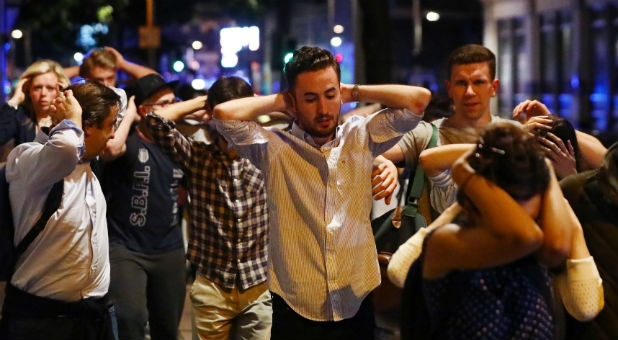Why Is Ramadan So Violent?
ISIS claimed responsibility for the London attack that killed seven and wounded 48. One of the terrorists wore a fake bomb vest. According to ABC News, the vest was likely intended to guarantee a police response that would lead to his martyrdom.
He was the father of a toddler; his wife was expecting a child. What would motivate him to carry out such an atrocity at the cost of his own life?
The day of the attack, an ISIS message called on its followers to use knives, guns and vehicles in an “all-out war” on “infidels” during Ramadan. The audio message instructed jihadists to “attack them in their homes, their markets, their roads and their forums.”
When Ramadan began this year, jihadists attacked a bus filled with Christians in Egypt, murdering 29. Ten of the victims were children. The day after Ramadan began, a suicide bomber murdered 18 people in Afghanistan, two of them children.
Last year’s Ramadan was the bloodiest on record. A gunman killed 49 and wounded 53 at an Orlando gay night club. An Islamist then stabbed a police officer and his wife in Paris. He claimed that he was responding to ISIS’ call for violence during Ramadan. Later that month, three ISIS suicide bombers killed 45 and wounded more than 250 at Istanbul’s main airport. When Ramadan ended last year, the final global body count was 421 dead and 729 wounded.
Why would terrorists make Ramadan a time to escalate their violence?
Ramadan is the ninth month on the Islamic calendar. Muslims believe that Muhammad received the first of a series of revelations that became the Quran on the 17th day of Ramadan in the year AD 610. For this reason, the month has always been holy to them (Quran 2:185). The month begins 11 days earlier each year on the solar calendar; this year, it extends from May 26th to June 24th.
During this month, Muslims fast from their first prayer of the day, at dawn, to the fourth, just after sunset. They also refrain from smoking and sexual relations during the day. They pray more fervently during the month and increase alms-giving.
Their increased fervor is not just to honor the month—it is also to receive greater rewards for themselves. Muhammad is believed to have preached a sermon on Ramadan in which he said, “Whoever performs an obligatory deed in (this month) shall receive the reward of performing seventy obligations at any other time.” A Taliban spokesman recently stated, “Our fight is Jihad and an obligatory worship. And every obligatory act of worship has 70 times more reward in Ramadan.”
We can expect further attacks this month as radical Islamists seek reward in heaven for committing atrocities on earth. But Ramadan is also an important time for Christians to intercede for Muslims and especially for jihadists. As Muslims focus more intensely on prayer and worship, many are seeing visions and dreams of Jesus.
Saul of Tarsus was committed to killing Christians until he met Christ (Acts 9:1–31). It’s vital that we pray for Islamist terrorists to experience the same transformation. F. B. Meyer believed that “the greatest tragedy of life is not unanswered prayer, but unoffered prayer.”
Is his warning especially true this month? {eoa}














































